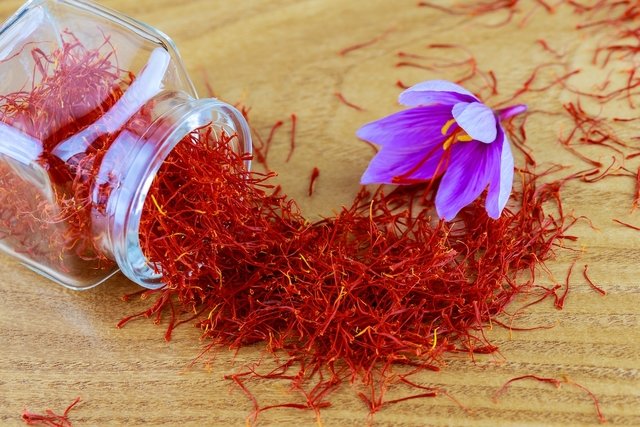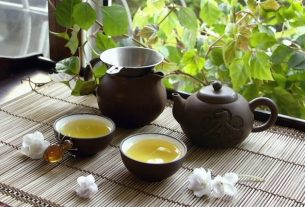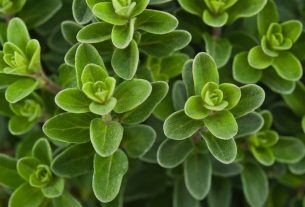Saffron is a medicinal plant that has a strong anti-inflammatory and antioxidant action, having several health benefits, such as relieving PMS symptoms, helping to control diabetes, promoting weight loss and preventing cardiovascular diseases, for example.
The main properties of saffron are concentrated in the orange filaments of the flower, which are rich in crocin, crocetin, safranal and kaempferol. Although they have similar names, saffron (Crocus sativus) is different from saffron (Turmeric is long), also known as turmeric, although both can be used in cooking.
Saffron can be found in health food stores, pharmacies, supermarkets or street markets, and is mainly used in cooking and preparing teas.

Main benefits
The main benefits of saffron are:
1. Fights depression
Some studies (1,2) have demonstrated that crocin and safranal, compounds present in saffron, have a similar action to some antidepressant medications, such as fluoxetine and imipramine, as they help to inhibit the reuptake of dopamine and noradrenaline, two types of neurotransmitters that regulate mood.
In this way, saffron can help in the treatment of depression, anxiety and mood changes.
2. Helps control diabetes
Saffron has antioxidant and anti-inflammatory properties, which protect pancreas cells and improve insulin production, regulating blood glucose levels, which helps control diabetes.
3. Promotes weight loss
Some studies (3,4) show that saffron can help with weight loss, because it improves mood and reduces appetite, reducing calorie intake during the day.
Furthermore, another study (4) showed that saffron supplement can also help decrease body mass index (BMI), waist circumference and total fat mass.
However, it is important to remember that to promote weight loss, the consumption of saffron must be associated with a healthy and varied diet and regular physical exercise.
4. Relieves PMS symptoms
Due to its anti-inflammatory, antioxidant and antidepressant properties, saffron can help alleviate some of the most common symptoms of PMS, such as irritability, anxiety, headache, colic and cravings for sweet foods.
5. Helps in the treatment of Alzheimer’s
Saffron has antioxidant properties that reduce damage caused by free radicals to neurons, in addition to increasing levels of acetylcholine, an important neurotransmitter for memory and whose levels are reduced in Alzheimer’s disease.
Furthermore, saffron also has anti-inflammatory properties that reduce the production of inflammatory and toxic substances for neurons. However, more studies are still needed to prove this benefit.
6. Prevents Parkinson’s disease
The antioxidant and anti-inflammatory effect of crocetin, present in saffron, helps protect neurons and can prevent and even help in the treatment of Parkinson’s disease, improving the lack of motor coordination. However, studies are still needed to prove this benefit.
7. Prevents cardiovascular diseases
Because it has antioxidant action, saffron helps reduce levels of “bad” cholesterol, LDL, in the blood, preventing the formation of fatty plaques in the arteries and preventing the emergence of cardiovascular diseases such as atherosclerosis, heart attack or stroke.
8. Improves sexual health
Saffron has aphrodisiac properties that help increase well-being, desire and libido, especially in people using antidepressants, improving erectile dysfunction in men and intimate lubrication in women. Discover other foods that improve sexual health.
9. Helps fight cancer
Some studies carried out (5,6,7) in the laboratory with skin, intestinal, breast, cervical, prostate and lung cancer cells show that the antioxidant substances present in saffron can help reduce the proliferation or promote the death of cells from these types of cancer.
Furthermore, saffron can make cancer cells more sensitive to chemotherapy treatment. However, studies in humans are still needed to prove this benefit.
Difference between turmeric and saffron
Turmeric, also known as turmeric, is a type of root similar to ginger and yellow in color. This root is generally used in powder form to season foods, but it can also be used to prepare teas and as supplements. Learn more about turmeric.
Saffron, known by its scientific name Crocus sativus or also called true saffron, is a flower with red filaments.
How to use saffron
Saffron can be found as a spice, being useful for seasoning foods, especially meats and sauces.
Furthermore, it can also be used in the form of teas and supplements.
1. Saffron tea
Saffron tea must be prepared with the red filaments present in the center of the flowers, from which substances with medicinal properties are extracted.
Ingredients:
- 1 teaspoon of saffron filaments;
- 500 mL of water.
Preparation mode:
In a pan or kettle, boil the water. After turning off the fire, add the saffron filaments to the water. Cover and let rest for 5 minutes. Strain, wait for it to cool and drink 1 cup of saffron tea, once a day.
As turmeric tea has a slightly bitter taste, you can add other ingredients, such as cinnamon, ginger or honey, to make the drink more pleasant.
2. Saffron Capsules
Another way to use saffron is in the form of capsule supplements, with a dose of 20 to 200 mg per day being generally recommended for a period of up to 3 months.
However, the time and dosage of the supplement varies depending on the person’s age and the objective being treated, and should therefore only be used under the guidance of a doctor.
Possible side effects
Saffron is safe for most adults when used in small amounts in food preparation or consumed for short periods of time.
However, when saffron is used in the form of teas or capsules, doses above 200 mg per day can cause side effects such as drowsiness, headache, delirium, dizziness, nausea, changes in appetite, vomiting or diarrhea.
Additionally, saffron may also increase the risk of bipolar hypomania, a phase of bipolar characterized by euphoria, racing thoughts, or agitation. Learn more about bipolar hypomania.
Saffron can also cause poisoning, especially when consumed in doses of 5 g or more, which can be life-threatening.
Who shouldn’t use
When used in teas or supplements, saffron should not be used by breastfeeding or pregnant women because it can promote uterine contractions, increasing the risk of miscarriage or bleeding.
Additionally, people with kidney disease or who are using anticoagulant medications should talk to a doctor before using saffron in the form of teas or supplements.
As this plant can increase the risk of bipolar hypomania, people suffering from bipolar disorder should only use saffron under the advice of a doctor.

Sign up for our newsletter and stay up to date with exclusive news
that can transform your routine!
Warning: Undefined array key "title" in /home/storelat/public_html/wp-content/plugins/link-whisper-premium/templates/frontend/related-posts.php on line 12
Warning: Undefined array key "title_tag" in /home/storelat/public_html/wp-content/plugins/link-whisper-premium/templates/frontend/related-posts.php on line 13



